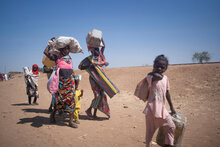Humanitarian Assistance Helps Stabilise South Sudan Food Security, But Concerns Remain For Next Year, WFP Warns
The provisional results of the latest Integrated Food Security Phase Classification (IPC) analysis released on Tuesday found that the food security situation has stabilised because of a significant humanitarian response coupled with normal rainfall and good conditions for growing crops. The seasonal improvements are expected to continue through the end of the year, particularly in areas not affected by the conflict. But the report warns that food security may deteriorate sharply early next year as their food stocks run out.
“Food security is improving, which is good news, but we are not out of the woods yet,” said Joyce Luma, WFP South Sudan Country Director. “The situation remains fragile, and a hunger catastrophe will continue to be a threat well into next year, especially if fighting continues. It is absolutely critical to sustain the humanitarian effort.”
The IPC analysis was conducted by food security and humanitarian assessment specialists from a number of aid and development agencies, along with technical experts from the South Sudanese government.
According to the IPC analysis, the number of people in Crisis and Emergency – phases three and four on a five-point scale – has dropped to 1.5 million from 3.9 million, and famine is not predicted anywhere in South Sudan in the next three months. The nutrition situation remains dire, with the prevalence of Global Acute Malnutrition (GAM) above emergency thresholds of 15 percent in most of the country.
The analysis indicates that food security will again deteriorate sharply in early 2015 without humanitarian relief, as people consume the last of their harvests and remaining livestock to meet their basic food needs. The outlook from January to March is of great concern, with 2.5 million people projected to be in the Crisis or Emergency phases, including nearly half of the populations in the conflict affected states of Jonglei, Upper Nile and Unity.
Humanitarian agencies have mounted a major relief effort in response to the crisis in South Sudan. WFP has used airlifts, airdrops, trucks and barges to deliver food and nutrition supplies for large-scale distributions.
In remote areas, joint emergency response teams – include staff from WFP, UNICEF, other UN agencies and NGO partners – are providing a full package of food, nutrition & livelihood assistance along with emergency health and protection services. Agencies are also working together to support civilians sheltering in UN-protected camps where conditions are difficult.
The need for humanitarian relief continues through the end of the year, and efforts must increase early next year to help people rebuild livelihoods, and to prevent a dramatic deterioration of food security and malnutrition in 2015. This includes beginning to pre-position food stocks when and where possible during the dry season.
“Donor support has allowed us to provide life-saving assistance so far, but we must not relent in our efforts, and we do need more resources to do that,” Luma said.
WFP has a funding shortfall of US$345 million to continue its essential work in South Sudan for the next six months.
# # #
WFP is the world's largest humanitarian agency fighting hunger worldwide, delivering food in emergencies and working with communities to build resilience. In 2013, WFP assisted more than 80 million people.
Follow us on Twitter @wfp_media and @wfp_africa
For more information please contact (email address: firstname.lastname@wfp.org):
George Fominyen, WFP/Juba, Mob. +211 922 465 247
Challiss McDonough, WFP/Nairobi, Tel. +254 20 762 2179, Mob. +254 707 722 104

